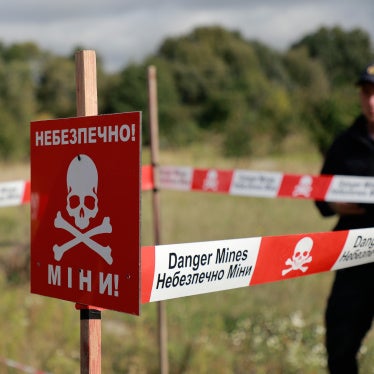Thank you for the floor, Madam President.
It is undeniable that the Mine Ban Treaty has had a tremendously positive humanitarian impact. Yet, we in the mine ban community are also struggling to cope with some serious challenges. Some of these challenges come from those outside the Treaty, notably the use of improvised antipersonnel landmines by non-state armed groups. But, we must also recognize the challenges within, those that States Parties themselves have brought about.
The Committee on Cooperative Compliance has just reported on its efforts with respect to allegations of use of antipersonnel mines by government forces in South Sudan, Sudan, Ukraine, and Yemen. We thank the Committee for its diligent and important work, and also thank it for the opportunity for the ICBL and its members to contribute to the process.
It is worth noting that there have been no new allegations of use by States Parties in the past two years. The allegations about government use in these four countries are now all two to five years old. The Compliance Committee has noted in its latest report that in all four of these cases, the States Parties have mined areas under their jurisdiction, but outside of their control, and that the cases would have to remain open until those states conclude appropriate investigations into those areas.
At the same time, the Committee notes that these States Parties have not provided information about any measures taken to deter the use of antipersonnel mines or to prevent and suppress any prohibited activity, in accordance with Article 9 of the Mine Ban Treaty and Action 29 of the Maputo Action Plan.
South Sudan told the Committee in February of this year that a previously promised investigative commission was being formed and that the security situation had improved and would allow for the investigation into allegations of use in the Upper Nile state. We believe that South Sudan has not reported progress since that time; we did not hear it mention an investigation in its remarks earlier today.
We regret that Sudan did not intervene during this session. In February 2016, Sudan reported that in two cases, allegations of use of antipersonnel mines by the Sudanese Army were unfounded. It said that in three other cases, allegations of use occurred in regions outside of the control of the Sudanese government. Sudan has reported no progress since that time.
We regret that Ukraine did not intervene during this session. Ukraine has acknowledged that its forces have used command-detonated mines, as permitted by the treaty, but none in victim-activated mode. The ICBL noted at the intersessional meeting in May that there recently had been photos of victim-activated antipersonnel mines, both MON-series mines with victim-activated fuzes and PMN-2 mines, that were allegedly captured from Ukrainian forces by rebels. More such photos and allegations have continued to appear. We again urge the Compliance Committee and Ukraine to look into this, to ensure that even limited, localized use of antipersonnel mines by government forces is not taking place.
In its remarks just now, and during the May intersessionals, Yemen indicated the conflict situation continued to prevent investigations into past use by government forces, but it committed to do so when feasible. We appreciate that Yemen said it would provide a update report by April 2017. In May, Yemen also stated that mines being used by opposition forces had been recently illicitly transferred into Yemen, and it said it would investigate this as well. Such transfers represent yet another challenge for the ongoing success of the Mine Ban Treaty.
Use allegations are by no means the only compliance issues of concern.
On Article 4, the long-missed stockpile destruction deadlines for Belarus, Greece, and Ukraine all remain unmet.
On Article 3, we fail to understand why States Parties are not speaking out and asking questions of the many States Parties that are keeping mines under the Article 3 exception without ever using them for any of the permitted purposes. These are in essence stockpiled mines, not mines retained for training or development.
We continue to believe that it would be beneficial for the Committee on Cooperative Compliance to look not only at compliance concerns related to use, but other areas within its mandate as well, including stockpile destruction and mines retained for training.
On Article 5, as has been widely noted by States Parties, Ukraine has been in violation of the treaty since 1 June 2016 for missing its clearance deadline without having requested an extension in time. We still hope Ukraine will move to remedy this situation this week, as it is clearly in its own best interests to do so. If not, other States Parties should make clear that it is unacceptable, and lay out their expectations for Ukraine to come into compliance.
On Article 7, the compliance rate for the transparency reporting requirement continues to be embarrassingly low (about 45% for 2015), indicating widespread disregard for this legal obligation.
In closing, it is vital to promote compliance with the norm being established by the Mine Ban Treaty: that there should not be any use of antipersonnel mines by any actor under any circumstance.
According to Landmine Monitor, in the past year, three governments continued using antipersonnel mines: Syria, Myanmar, and North Korea. In each case, the number of mines used appeared limited.
However, non-state armed groups have continued using antipersonnel mines (or improvised antipersonnel mines, also called victim-activated improvised explosive devices, which are prohibited by the Mine Ban Treaty) in at least ten countries, with extensive use in Afghanistan and Iraq, significant use in Libya, Syria, and Yemen, and more limited use in Colombia, Myanmar, Nigeria, Pakistan, and Ukraine.
States Parties should condemn any new use by non-state armed groups as well as government forces, and States Parties should seek out new ways to stigmatize and stop the use of improvised antipersonnel mines.
Thank you.








